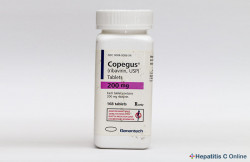Copegus (ribavirin) Coupons, Discounts & Cost
Copegus (ribavirin) is a synthetic nucleoside analogue that is active against certain DNA and RNA viruses (hepatitis C virus). One way to save money on the Copegus (ribavirin) retail cost regardless of income and insurance status is to use Copegus (ribavirin) coupons or discount cards from RXCoupons. Use our Copegus (ribavirin) coupons at your online pharmacy and receive up to 75% off the sale price each time you refill your prescription.
What should I know about Copegus (ribavirin)?
Copegus (ribavirin) is a synthetic nucleoside analogue that is active against certain DNA and RNA viruses (hepatitis C virus). Copegus gives a very good effect in patients with hepatitis C. The active ingredient of the drug - ribavirin - inhibits certain DNA and RNA viruses.
The dosage of the drug depends on the individual patient body weight, the clinical response of the organism, and the various individual parameters.
Copegus is used in combination with interferon alpha-2a or peginterferon alfa-2a for the treatment of chronic hepatitis C in adult patients, including patients with compensated cirrhosis. Copegus is not used as monotherapy.
The drug is also used in combination therapy with peginterferon alfa-2a in HIV-coinfected patients, including those with compensated cirrhosis.
Copegus (ribavirin) dosing regimen
The dose of the drug depends on the patient’s weight. The usual dose of Copegus: For patients weighing less than 75 kg: 2 tablets in the morning and 3 tablets in the evening (1000 mg total per day). For patients weighing more than 75 kg: 3 tablets in the morning and 3 tablets in the evening (1200 mg total per day). The tablets should be taken with food and swallowed without chewing (with water). The treatment should be done only under medical supervision. The usual course of treatment is 24 to 48 weeks.
Copegus (ribavirin) side effects
Copegus (ribavirin) may cause the following side effects: severe chest pain, chronic cough, irregular heartbeat, breathing problems, confusion, severe abdominal pain, blood in urine and stools, severe nosebleed, fever or chills, vision problems. The most commonly reported side effects in patients taking Copegus in combination with peginterferon alfa-2a or interferon alpha-2a: flu-like symptoms, pain syndromes, nausea and diarrhea, insomnia, hair loss, irritability, skin reactions. Other common side effects: weight loss, anxiety, memory loss, increased sweating, mood swings and back pain. Rare side effects: dry mouth, sores in the mouth, decreased libido, insomnia, tremors, anemia, palpitations, eye irritation, nasal congestion, respiratory tract infection, anemia, bleeding or bruising, renal failure, nephrotic syndrome, impotence. General disorders: fever, chills, pain, fatigue, weakness, irritability, chest pain, flu-like symptoms, malaise, lethargy, hot flushes.
Copegus (ribavirin) main contraindications
The main contraindications are: hypersensitivity to ribavirin or other components of the drug, pregnancy and breastfeeding, severe abnormality of the heart (including unstable and uncontrolled cardiac pathology during the previous six months), severe liver or uncompensated cirrhosis of the liver, hemoglobinopathies (thalassemia, sickle-cell anemia).
Copegus (ribavirin) and pregnancy
Ribavirin has demonstrated significant teratogenic and embryotoxic potential. The frequency and severity of teratogenic effects increased with higher dose of ribavirin.
Copegus must not be used during pregnancy. Treatment with Copegus may be initiated only after a negative pregnancy test immediately prior to treatment. It is important for women of childbearing age to use effective methods of contraception during the treatment period.
Copegus (ribavirin) interaction with other drugs
Simultaneous administration of antacids containing aluminum, magnesium and methicone may reduce the bioavailability of ribavirin.
Simultaneous use of the drug with zidovudine or stavudine may increase HIV plasma viremia. Therefore, careful monitoring of plasma HIV RNA levels is recommended in patients using concurrent treatment with zidovudine and Copegus.
Simultaneous reception of ribavirin and didanosine is not recommended. The combined use of these drugs can lead to liver failure with fatal outcome, peripheral neuropathy, pancreatitis, symptomatic hyperlactatemia or lactic acidosis.
Ribavirin should not be used with azathioprine.
Patients coinfected with HIV: concomitant use of ribavirin and zidovudine is not recommended due to an increased risk of anemia.
Copegus (ribavirin) overdose
If you exceed the maximum recommended dose of more than 4 times, you may suffer from hypocalcemia and hypomagnesemia.
Overdose treatment: symptomatic therapy.

